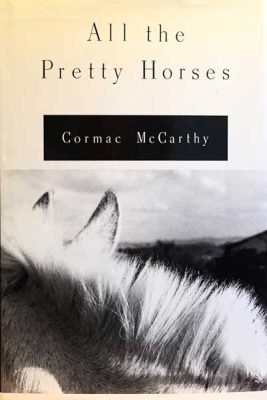Back in the Saddle With Cormac McCarthy
Review An assessment or critique of a service, product, or creative endeavor such as art, literature or a performance.
By Michael Malone
 My experience with Cormac McCarthy’s novels has been mixed. As I’ve noted here before, I adored The Road, and could not imagine having enjoyed Blood Meridian less.
My experience with Cormac McCarthy’s novels has been mixed. As I’ve noted here before, I adored The Road, and could not imagine having enjoyed Blood Meridian less.
And so I set out to read All the Pretty Horses, wondering which end of the spectrum it would fall on for me.
All the Pretty Horses is about two teen boys, setting out on horseback from Texas, entering Mexico, getting in a bit of trouble, and coming back to Texas.
It is set in 1949.
John Grady Cole is one boy. He’s smart and tough and very good with horses.
Lacey Rawlins is the other boy. He doesn’t have a whole lot going on.
If I’m being truthful, as I always try to be with A Novel Concept readers, All the Pretty Horses does not have a whole lot going on either. Just over 300 pages, it’s a slim novel, and there’s not a whole lot of story.
McCarthy offers intensely detailed descriptions of the landscape out west and in Mexico. Beyond that, I’m not really sure just what’s at stake. John Grady falls in love with a teen Mexican aristocrat. He goes through considerable measures to win her hand, but it’s just not to be. He is tossed in a makeshift Mexican prison and sustains some serious abuse, including getting his teeth knocked out by a sock full of gravel, getting stabbed, and shot in the leg.
John Grady has a unique solution for his stab wound: Heating up his pistol’s steel barrel over the campfire, then sticking the smoldering-hot gun barrel into his bullet wound. One suspects that hurts a bit.
I thought of John Grady as the horse whisperer. He’s got a knack for dealing with difficult horses, which makes him useful on the various ranches he stops in at for work.
Rawlins, not so much.
The reader encounters many peculiar words to describe the landscape. McCarthy writes, “Once outside the town he left the road altogether and set off across the immense and ancient lakebed of the bolson. He crossed a dry gypsum playa where the salt crust stove under the horse’s hooves like trodden isinglass and he rode up through white gypsum hills grown with stunted datil and through a bale bajada crowded with flowers of gypsum like a cavefloor uncovered to the light.”
I read that paragraph three times and still am not sure just what to envision.
McCarthy also piles on the horse jargon: “Then they slipped the hackamore off the horse’s head and John Grady raised the bosalea and gently fitted it over the horse’s nose and fitted the mouthrope and headstall.”
Besides the novel being written in at times indecipherable English, much of the book is also in Spanish, with no translation. John Grady speaks a bit of it, and Rawlins does not.
I don’t either. So I was further in the dark.
At one point, Rawlins asks John Grady for help with the local patois.
“What’s a pucha?” he asks.
“A cigarette butt.”
“Then what’s a tecolata?”
“Same thing.”
McCarthy died last year. He is considered one of the great American novelists. The Road picked up the Pulitzer Prize in 2007. No Country For Old Men became a hit film for the Coen brothers. I read yesterday that Blood Meridian is becoming a film as well.
Billy Bob Thornton directed the Pretty Horses movie, which came out in 2000. Matt Damon played John Grady and Penelope Cruz was the Mexican aristocrat, Alejandra.
Readers love McCarthy, if not quite as much as the critics. All the Pretty Horses has a 4.04 rating, out of 5, with nearly 125,000 people weighing in on GoodReads. The Road has a 3.99 and deserves better, and Blood Meridian has a 4.16, and deserves half of that.
All the Pretty Horses is book one in McCarthy’s Border Trilogy, with The Crossing (4.15) and Cities of the Plain (4.12) rounding out the trio.
A review of the novel in the Boston Globe said, “All the Pretty Horses’ elegiac rhythm captures the badlands of Texas and northern Mexico with a passion most writers either couldn’t muster or wouldn’t dare.”
I was less enthused. Another issue I had is the title. It is, more than anything, a book about horses. John Grady loves those things. But the word “pretty” in the title of a novel that’s so dark and dusty and dirty simply does not work.
But read it carefully, and you’ll see an odd little trick from the author. On page 5, McCarthy writes of John Grady, before his grand horseback adventure takes place, “He rode with the sun coppering his face and the red wind blowing out of the west.” On the book’s final page, his adventure concluded and John Grady back in Texas, McCarthy writes, “He rode with the sun coppering his face and the red wind blowing out of the west…”
McCarthy is suggesting not much has changed for John Grady over the course of the novel.
But we know that’s never the case for a guy who shoves a red-hot gun barrel in his bullet wound.
Journalist Michael Malone lives in Hawthorne with his wife and two children.

Examiner Media – Keeping you informed with professionally-reported local news, features, and sports coverage.
